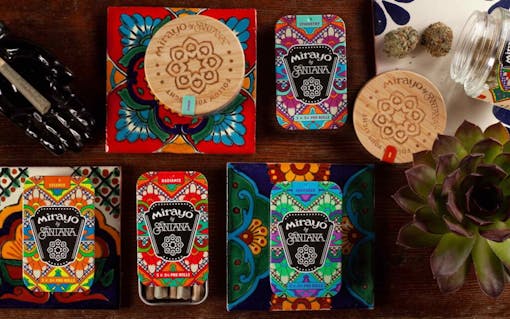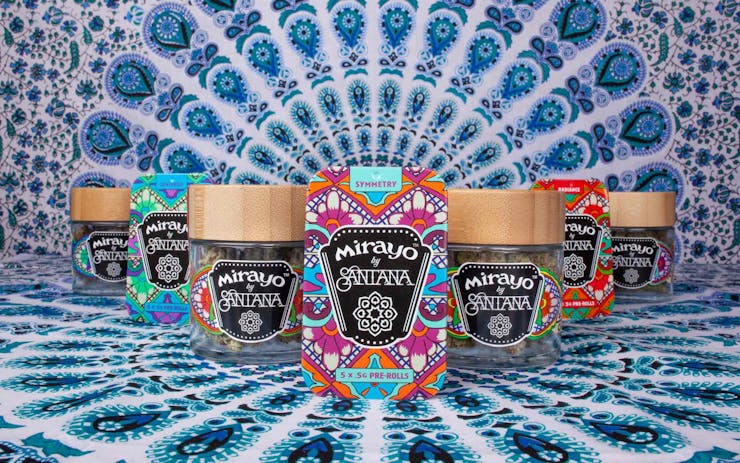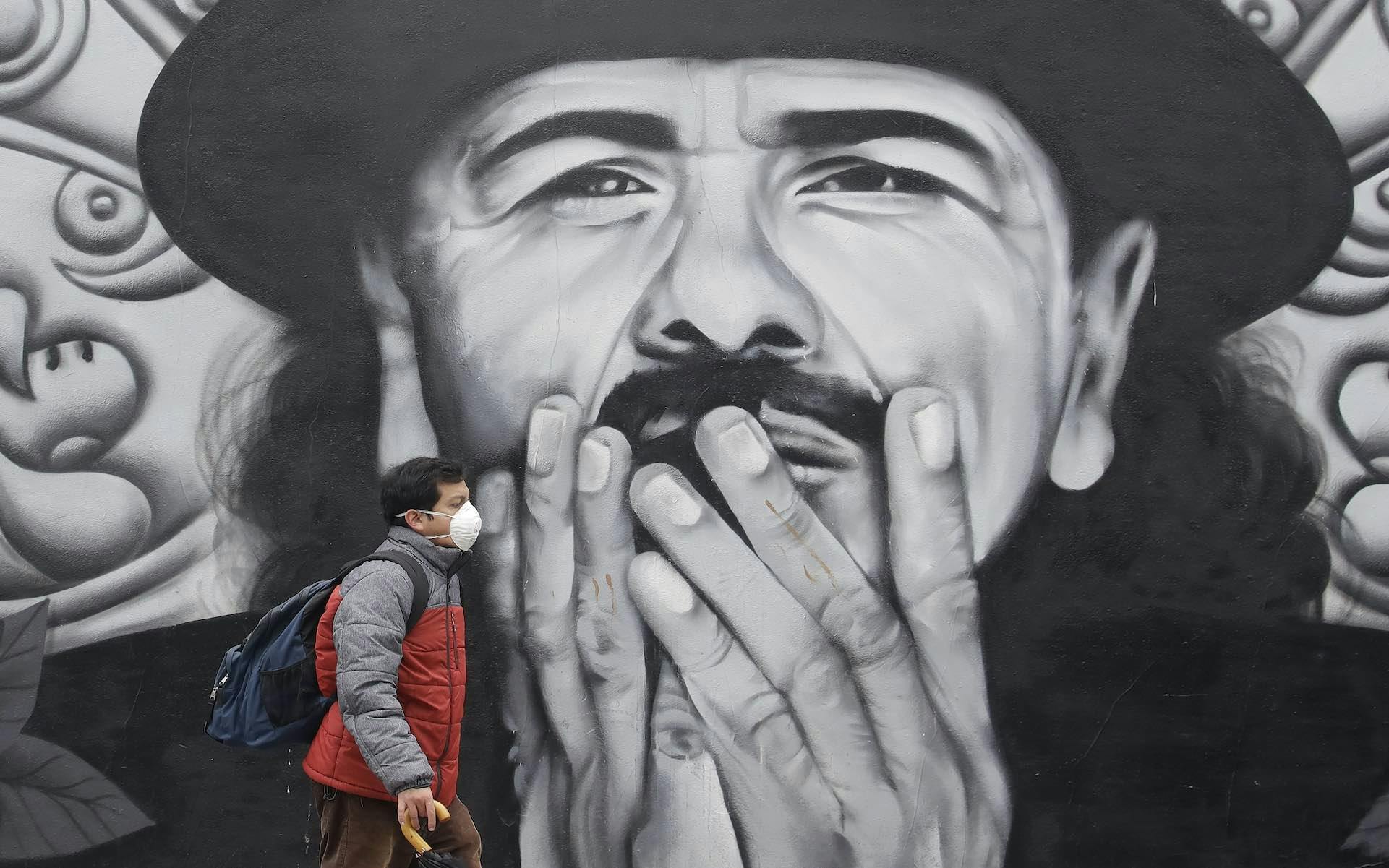We dare you to try and find a more authentic front man to lead a celebrity cannabis brand in 2020 than Carlos Santana.
Cannabis is woven into the music icon’s life—from birth in Autlan, Jalisco, Mexico, to being a kid in Tijuana, to high school in San Francisco, playing Woodstock, traveling around the world, to today at age 73 on the island of Kauai, where Carlos is riding out the pandemic.
Available now in the Bay Area and Southern California dispensaries, Santana lovers across California can share his herbal frequency with new weed brand Mirayo by Santana. Three types of pre-rolls or 7-gram flower jars—Radiance, Symmetry, and Centered—span the sativa to indica spectrum.
Ten-time Grammy winner Santana partnered with the same Santa Rosa, CA, company that runs Grateful Dead drummer Mickey Hart’s weed brand Mind Your Head, and Marley Naturals, from Bob Marley’s family.
Find legal cannabis nearby. Order on Leafly, pickup today
Mirayo means ‘my ray’ or ‘my light,’ in honor of Santana’s Mexican heritage and hippie ethos. In this lightly edited interview, the San Francisco protégé of Jerry Garcia and rock promoter Bill Graham tells Leafly readers to realize “heaven is a decision,” and to “listen to your own light.”
Leafly: Congrats on the launch of your cannabis brand.
Santana: Yes, I feel very grateful to be in company of my brother Bob Marley and Mickey Hart.
Your history with cannabis goes back to when you were a kid and your mom made topicals in Tijuana? That’s so crazy.
Santana: Yes, the medicine has been used since time immemorial by American Indians from Canada to Brazil. They always knew that there was ‘medicine’ and ‘drugs.’ Medicine—Mother Nature makes with the help of photosynthesis, which is the sun. Drugs are made in a laboratory by a man. So there’s drugs and then there’s medicine. And my mom always knew about herbs for tea and ointment and all kinds of stuff.
But basically we’re talking about healing and correcting molecular structure.
Leafly: Cannabis poultices for arthritis are thousands of years old and no one knows about it. Mexican folk chemistry and folk pharmacology had this stuff nailed down since just after Columbus, it sounds like.
Santana: Right, you have two dimensions of consciousness or lack of consciousness on this planet. You have those that believe that there’s no light in you, you’re a wretched sinner. And people like shamans, American Indians, from Timbuktu all the way to Siberia, who know that there’s another way to be aware of your own healing powers.
And once you become knowing of these ingredients and nutrients that the Earth makes, that puts you as an adversary for the people who make a lot of money selling opioids. Every single commercial on TV. So you have these pharmaceuticals, people who make a lot of money selling opioids and things that if you want to heal something, a lot of stuff goes wrong. (And they tell you, ‘If you do this, this other stuff is going to happen.’) But people who have wisdom—not clever fools, wisdom—know it’s something designed to heal and correct, not to put a little band-aid, but you never really fix the problem.
When you bring a healing to pain, not with a pill, but with something that the Earth makes—they both affect molecular structure. And both depend on the word ‘faith.’

Once I learned what I learned from mom, and then the things that I learned in the Haight-Ashbury from the Hippies, then I realized that there were two different frequencies on this planet: the frequency of self-deception; and the frequency of self-discovery.
Leafly: San Francisco in ’65, Mission High School, can you describe what cannabis culture was like back then? Do you remember your formative experiences in middle school and high school?
Santana: What I remember is that San Francisco at that particular time was ground zero for consciousness revolution. Pot used to be sold in matchboxes.
And I remember those who were smoking it, they were listening specifically to The Doors or John Lee Hooker or, of course, Jimi Hendrix and The Beatles.
Once The Beatles met Bob Dylan, then the square stuff went out the window. All the boy band went out the window, and they became more conscious with the music, the writing.
That’s because they discovered what Bob Dylan discovered, which was smoking weed and mushrooms or whatever. And then all of a sudden you saw The Beatles with real long hair and the music became different.

So a big part of San Francisco permeated all over the world to the Midwest and the universities, and the consciousness revolution makes you question authority if it’s not enlightened by God. You not only get high, but you tune in, turn on, and drop out. Drop out from being a droid. A goon. A robot that only is programmed to follow a certain system by religious people in government. That’s why hippies were a threat to the institution.
If you took a toke, something else opened up in your perception, like the doors of perception. That’s why we loved The Doors and The Grateful Dead. Because they helped people in the Midwest coming to San Francisco—don’t come here and get a fake wig or a fake mustache. Come here with real genuine principles of ‘How do we affect this planet with benevolence and for the highest good?’
So hippies to me were different than they were to a lot of people. I’m still a hippie. I will always be a hippie. Because hippies want a different form of principles and ideology that benefits everyone; not just the few who are greedy.
Leafly: Do you feel like your life trajectory was set by time you were leaving San Francisco to go to Woodstock and play?
Santana: Yeah, the two, principal people in my life at that time were [pioneering rock promoter] Bill Graham and Jerry Garcia. They were the ones who looked at me with eyes that they saw in me something that I wasn’t seeing in myself.
Somehow Bill Graham, and Jerry Garcia, and Michael Bloomfield, Tito Fuente, BB King, a few others saw in me something that was worth nurturing.
When they’d see me they had a certain smile and Jerry would grab the guitar and say, ‘Hey, have you tried this?’ and he’d go with his fingers on the neck of the guitar and share with me a certain passage.
Jerry was not insecure about sharing. People who are insecure, they don’t want to share. They give you their back. They turn their back on you because they don’t want you to steal their stuff. Jerry was the opposite. And same thing with Bill Graham.
“Heaven is a decision. Not a condition, or a destination. A decision.”
—Carlos Santana
So I’ve been really, really blessed. Here I am still with Mickey Hart, part of something that is still expanding good will to all mankind.
Leafly: We’re in 2020, 11 states have legalization, 30-plus have medical use, the MORE Act is in the House of Representatives, and 11 years ago you were telling Obama we should legalize. How does it feel to see the arc of cannabis policy reform bend in America over these decades? What does that feel like to a person who’s seen it all?
Santana: It feels like vindication. It feels like the elder people who were square, and they drank whiskey and scotch and whatever, and they see anybody who is smoking pot and long hair as like communist and dirty-minded—it feels good that they have either turned a leaf, or they died. And they took that negativity with them.
Their children and their children’s children realized what we knew: We need to expand our minds beyond the Bible and the Constitution. We need to listen to our own light.
Anyone who tells you that, ‘It’s a deception’, that, ‘Only Jesus is light’ and you’re chopped liver? That’s what the hippies were about—like, ‘No! Christ’s consciousness is for all!’
And they didn’t want you to think like that, because they make money like pimps exploiting you; exploiting your faith. There’s like 20, 26 channels in Kauai alone of ministers selling you lies and illusions about what you should do, or what you should be, in order to go to heaven.
And so here it is, and I’ll say it again: Heaven is a decision. Not a condition, or a destination. A decision.
Leafly: Has cannabis played a role in your spirituality?
Santana: Yes. They symbiotically go hand in hand. When you listen to Sgt. Pepper’s or anything with Jimi Hendrix the first three albums, Santana’s Abraxas—you know there’s certain music, you know that spirituality and smoking the herb—Bob Marley’s ‘One Love,’ I mean, look: No matter how hip you think you are, if you’re not for the highest good of all—and if you’re not grooving at a Grateful Dead concert or a Santana concert—you could be king of the heap or whatever—but just because you smoke weed or do drugs, it doesn’t make you a hip.
[John] Coltrane didn’t do that. Herbie [Hancock] don’t do that.
What makes you really, really hip and wise is when you listen to your own light and you get high with your own spirit.
It helps me for me to get into a place where I had to learn detachment and stand back. From everything that I was taught and programmed, like a computer laptop.
Because when you’re born, you’re born with the same knowing that Tesla and Einstein have, but they de-genius you. They convert you to a wretched sinner, good for nothing, only Jesus got the toilet paper and you’re full of shit. Like, ‘What?!’
And we love Jesus. We love Buddha, Krishna, Allah, Rama—we love Christ consciousness. What we don’t like is someone pimping you with negative programming about who they think you should be, instead of what God imbued you with.
So, yes, for me they both go together like a peppermint stick: you got red and white, and so you have consciousness and you have spirituality. You have being aware. When you take a toke, something is going to happen to your peripheral vision. All of a sudden you start using all the mirrors around you. Because you do have options.
” … when you take a toke you stop time, and you enter into eternity moments.”
Carlos Santana
A square is when you only see through one window. An aware person sees through all of the windows that you are. Not just one. All of the windows should take you to a place where you are able to heal.
That’s why Jerry Garcia and myself and whoever—we play music to heal people from fear, and disharmony. Grateful Dead concerts—they’d say they’re about ‘unity, harmony, and celebrating the spirit in the life.’ That’s what it’s about. It’s not complicated, and it makes you feel good.
Leafly: You’re 73—do you still smoke weed, or is it more tinctures, if at all?
Santana: I’m in a place where had a recent knowing wisdom that I am very flattered and honored that people came to me and offered me this opportunity to be part of part of Mickey Hart and Bob Marley.
I have no problem pledging everything that we would make financially to the American Indian reservations. I have no problem because by the grace of god after Abraxas—I don’t have an outlandish, weird things that I have to have. I’m not lusting forever with materialistic stuff. I’m grateful that being on this planet I am able to be of service to India, Africa, South America and, specifically, now American Indian reservations—Navajo, Apaches, Hopi.
I pledge everything that I receive in this venture—because it is a venture, an adventure—to my sisters and brothers to have pure, fresh, clean water, possibly have a potential to go to universities and educate and become lawyers so we can fight in a spiritual way for our own rights. I have no problem pledging all of it, and I mean all of it, to help my sisters and brothers. That to me is what I’m all about at this point.
Leafly: Do you get free samples?
Santana: I got some of them. I’ve lived in Kauai since March and they couldn’t send it to Kauai because it’s still against the law to send it from one state to the other. I love the way it looks, I like the way it feels, and eventually I will be able to participate with them in creating a new narrative. I have something that envisions saying ‘cool’ or ‘cool meditation.’ Maybe the herb has a bit of mint-like, minty fresh—you take a toke and it’s like Mentos, and you go, ‘Heyyy.’
Leafly: Has there ever been a time cannabis wasn’t a friend in your life?
Santana: Since the beginning, it’s always been around me. I made a choice in ‘72 to ‘82 not to do anything. I became like a West Point military by switching over to a spiritual path. I didn’t do anything other than just drink water and have grilled cheese sandwiches and salads. No meat. No smoking herb. Nothing. No wine. No nothing. And it helped me. It helped me become more who I am now.
Now I know what it is to appreciate. When I do take a toke now, I’m able to like really appreciate Jimi Hendrix and The Grateful Dead and Miles Davis, Coltrane. Because when you take a toke you stop time, and you enter into eternity moments. There’s a difference between time and eternity-instant moments, you know, like, spiritual moments, sacred moments.
And so, with all respect, we’d say, ‘A square doesn’t know the value of eternity in an instant.’ William Blake did. He wrote poems about it. For a long while Bob Dylan was the pied piper, whether he liked it or not. Everybody was following what Bob Dylan was saying or doing, you know, including Jimi Hendrix.
Because there was something about Bob Dylan’s consciousness, his poetry, and just music that led us to believe that we are precious, unique individuals with authenticity. That’s why we love Bob Dylan, including The Beatles. When they saw Bob Dylan, they were not The Beatles anymore. They became conscious musicians.
Leafly: Thanks, Carlos.
Santana: Thank you so much and stay precious and thank you for helping transmit the frequency of benevolence. Peace.






